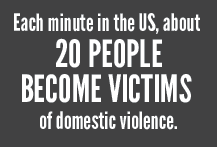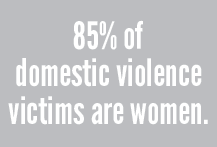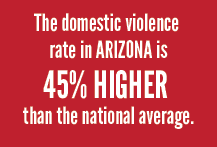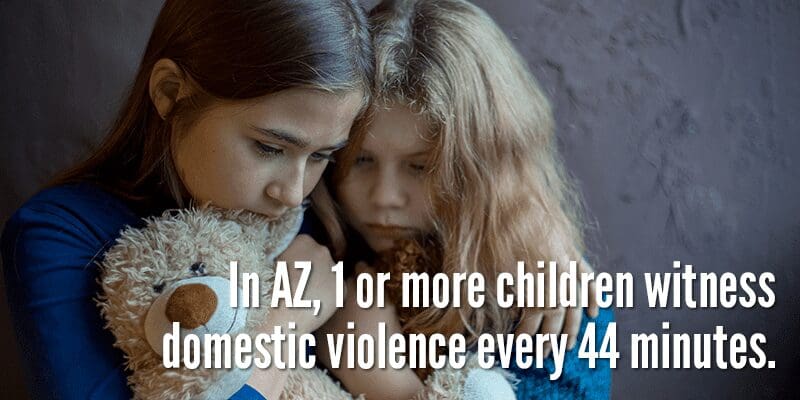In the United States, 1.3 million women experience domestic violence annually(1). Domestic violence profoundly traumatizes victims, potentially affecting them for the rest of their lives if they do not receive proper support. We know from numerous studies that domestic violence has long-term negative effects on children, and that it creates a cycle wherein children who witness domestic violence are more likely to become abusers as adults. Through our mentor program, Live and Learn empowers female survivors of domestic violence to overcome their trauma, help their children, and build a better future for their families.
Lasting Effects
 Being a victim of domestic violence has long-lasting emotional and physical consequences. Emotionally, victims are more likely to suffer depression, anxiety, low-self-esteem, reduced memory capacity, and post-traumatic stress disorder. Physically, victims struggle with chronic pain, insomnia, reduced immune system functioning, and higher incidents of migraines, asthma, and diabetes(2). These emotional and physical consequences affect individuals while they are living in a domestic violence situation, and they continue to affect survivors for years and decades after they escape. Survivors find that these consequences can severely limit their educations, their professional careers, their inter-personal relationships, and their overall well-being.
Being a victim of domestic violence has long-lasting emotional and physical consequences. Emotionally, victims are more likely to suffer depression, anxiety, low-self-esteem, reduced memory capacity, and post-traumatic stress disorder. Physically, victims struggle with chronic pain, insomnia, reduced immune system functioning, and higher incidents of migraines, asthma, and diabetes(2). These emotional and physical consequences affect individuals while they are living in a domestic violence situation, and they continue to affect survivors for years and decades after they escape. Survivors find that these consequences can severely limit their educations, their professional careers, their inter-personal relationships, and their overall well-being.
The effects of domestic violence on children resemble the effects on adults—and are just as long-lasting. Ninety percent of children who live in a home with domestic violence are aware of it(3). These children struggle emotionally and physically, even if they are not directly abused themselves. They perform worse in school, have more behavioral issues, and develop fewer positive friend relationships. Children who witness domestic violence are more than twice as likely to adopt such behavior themselves as adults, creating a generational cycle of domestic violence(4).
Our Mentor Program
 Over 50% of Live and Learn clients are or have been victims of domestic violence. Our mentor program is designed to support these clients as they end the violence, heal their trauma, and care for their children. We offer individual mentorship, in which our trained volunteer mentors work one-on-one with clients, and we also offer a range of regular group mentor sessions led by our Program Mentor.
Over 50% of Live and Learn clients are or have been victims of domestic violence. Our mentor program is designed to support these clients as they end the violence, heal their trauma, and care for their children. We offer individual mentorship, in which our trained volunteer mentors work one-on-one with clients, and we also offer a range of regular group mentor sessions led by our Program Mentor.
This mentorship has been incredibly effective, and we hear from many clients that their mentors are essential to their recovery and their success. Every client’s needs are unique, and every mentor brings their own skill-set to the relationship. Here are seven ways our mentor program benefits our domestic violence clients:
- It creates a space for women to heal their trauma surrounded by other women who have been through it. Many of our clients have very recently left their abusive situation; some are still in it. Our Program Mentor works very purposefully to create an environment where women support each other while healing their trauma under her qualified care. Each woman’s needs in this area are different, but these needs must be addressed if she is to succeed in her journey out of poverty.
Live & Learn provided a three-day mentoring seminar for me. This was a huge help. It really allowed me to heal.
-Live and Learn client, Survivor
- It helps the women build a strong social network. Through our program, women form strong connections with each other. Our group mentor sessions bring women together weekly or monthly in a caring, trusting environment. The connections women form with each other last long after the women have completed Live and Learn’s two-year program. Strong social bonds cannot prevent domestic violence, but they do make it significantly more likely that the victim will escape the situation sooner(5).
Being around all these other women who all have had this struggle that we’re all overcoming together, it just finally feels like it’s all going to be okay. — Live and Learn client, Survivor
- It teaches women crucial parenting skills to end the generational cycle of domestic violence. We offer group mentoring sessions that focus on positive parenting skills. Our clients look at the problematic behaviors they learned in their own childhoods and understand how they are passing these on to their children. These sessions promote healthy, respectful parent-child relationships and teach women practical steps for fostering positive family dynamics that support and nurture their children.
- It allows women to recognize their self-worth. As one Live and Learn client who is a survivor put it, “I heard ‘you’re worthless’ all the time, every day I was with my ex-partner, and I came to believe it.” Self-worth is the sense that you are valuable as a person, that regardless of your circumstances or your mistakes, you deserve respect, love, and compassion. One of the most important things our mentor program does is to help women believe that they are worthy. Our mentors work with women to examine the beliefs and attitudes they hold about themselves. It is crucial that the women in our program really believe they are strong, capable, and worthy so that they can tackle their education and start their careers.
- It’s a self-confidence boost! Experiencing domestic violence often destroys an individual’s self-confidence, replacing it with self-doubt. Through individual and group mentoring, our mentors work hard to re-build clients’ self-confidence. Self-confidence allows a woman to try new things, take chances, and set goals.
Now I have so much more confidence than I ever had. Now I’ve done some public speaking and even a radio interview. I can’t believe that I can do that!
-Live and Learn client
- It teaches women communication and conflict management skills. Survivors who struggle with depression, anxiety, low self-esteem, or PTSD often struggle to manage relationships in all areas of life: family, romantic, collegial, or professional. Through group and individual mentorship, our clients learn how to assert themselves appropriately, how to communicate openly and honestly, and how to effectively resolve conflict. They learn how to recognize and foster relationships based on respect and trust.
- It offers hope. Twenty-three percent of survivors of domestic violence attempt suicide, which is over seven times the attempted suicide rate of people without a history of domestic violence(6). By allowing women to heal, letting them recognize their own value, and teaching them to foster positive relationships, our mentor program helps women emerge from their depression and anxiety. Our individual mentors work with the women as they progress along their journey towards economic self-sufficiency.
So many fears and doubts crept into my mind during the process as a Live and Learn client, but Live and Learn always gave me hope.
-Live and Learn client
Conclusion

One in four women will experience domestic violence in her life. Our mentor program is a crucial support for our clients who are survivors. We know that ending the violence, healing from its emotional and physical consequences, and supporting the children involved is essential to our mission of empowering women to create a better future for their families.
(1) http://domesticviolence.az.gov/domestic-violence/facts-and-figures
(2) https://www.cdc.gov/violenceprevention/pdf/nisvs_report2010-a.pdf
(3) https://www.orentcriminallaw.com/domestic-violence-statistics-arizona/
(4) http://domesticviolence.az.gov/domestic-violence/facts-and-figures
(5) https://www.preventioninstitute.org/download/pi_publication/node-field_download_files-2130-0
(6) https://www.domesticshelters.org/domestic-violence-articles-information/domestic-violence-survivors-at-higher-risk-for-suicide



